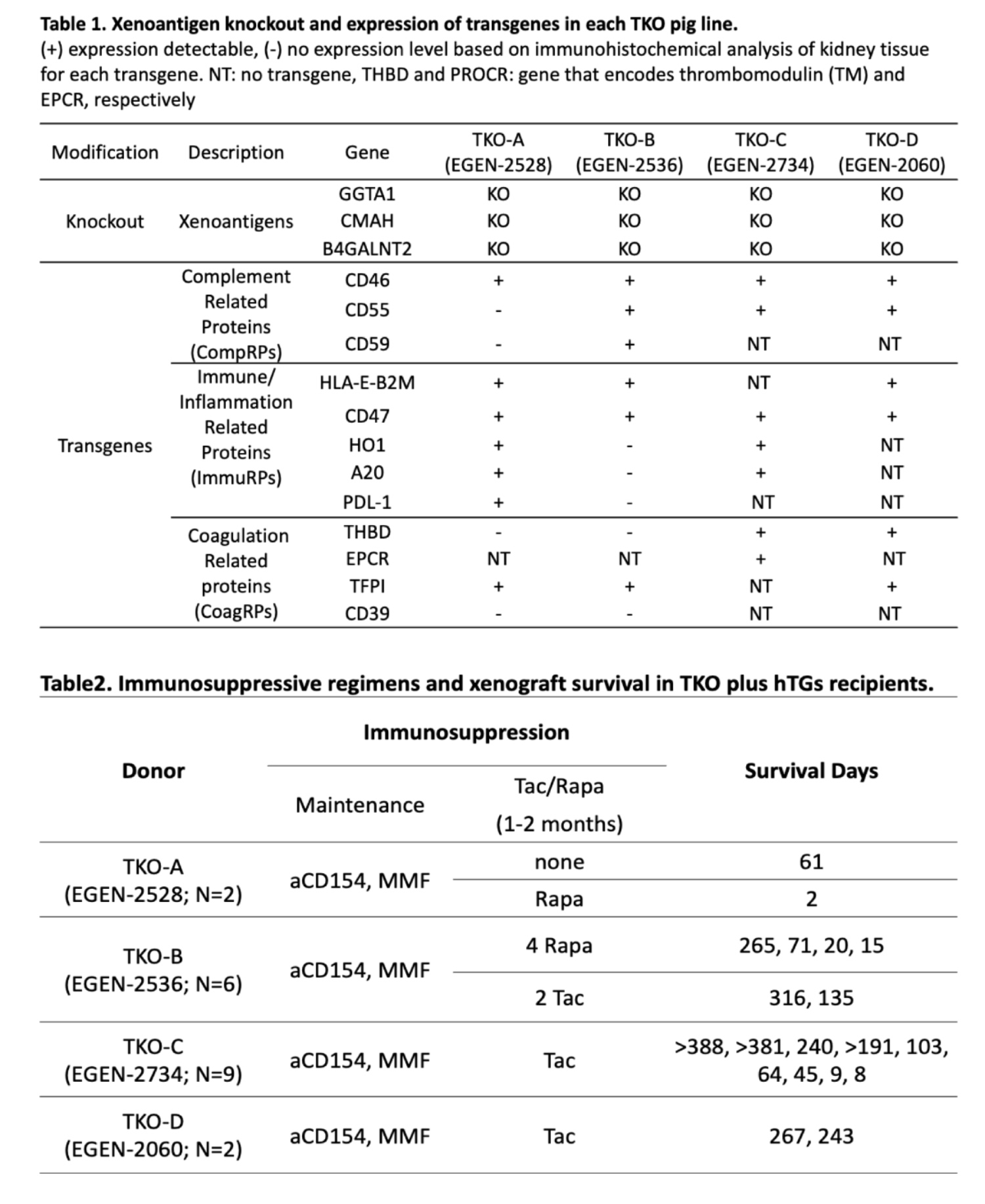Long-Term (>1 Year) Rejection Free Graft Survival of Kidney Xenografts with Triple Xenoantigen Knockout and Multiple Human Transgenes in Cynomolgus Monkeys
1Center for Transplantation Sciences, Massachusetts General Hospital, Boston, MA, 2eGenesis Inc, Cambridge, MA
Meeting: 2022 American Transplant Congress
Abstract number: 78
Keywords: Kidney transplantation, Pig, Rejection, Xenoreactive antibodies
Topic: Basic Science » Basic Science » 13 - Xenotransplantation
Session Information
Session Time: 3:30pm-5:00pm
 Presentation Time: 3:40pm-3:50pm
Presentation Time: 3:40pm-3:50pm
Location: Hynes Room 302
*Purpose: Pigs with deletion of 3 carbohydrate xenoantigens (triple knock-out, TKO) are expected to be optimal donors for human xenotransplantation. We have previously shown that long-term survival of the kidney xenograft from TKO pigs is possible even in cynomolgus monkeys, which belong to “old world monkeys” that exhibit higher anti-porcine antibody binding to TKO cells compared to humans. We hypothesized that concomitantly inserted human transgenes (hTGs) are important to attenuate immune responses caused by higher anti-porcine antibodies. In the current study, hTGs that encode coagulation regulatory proteins (CoagRPs), such as thrombomodulin (TM) and endothelial cell protein C receptor (EPCR), were included.
*Methods: Seventeen cynomolgus monkeys received kidneys from four different TKO pig lines (TKO-A to D) with various expression human immune regulatory proteins (ImmuRPs), complement regulatory proteins (CompRPs) and CoagRPs. Recipients were treated with anti-rhesus thymocyte globulin (rhATG) and rhesusized rituximab induction followed by weekly anti-CD154 antibody and daily mycophenolate mofetil. Prednisone and either rapamycin or tacrolimus were also administered for the first two months.
*Results: Two recipients of TKO-A, which expressed higher ImmuRP with lower CompRPs, survived for 2 and 61 days, while recipients of TKO-B with high CompRPs and lower ImmuRPs survived for 15, 20, 71, 135, 265 and 316 days (Table 2). In TKO-C, TM and EPCR were added to CompRPs and ImmuRPs. For TKO-C recipients (n=9), 2 lost xenografts on days 8 and 9 due to thrombotic microangiopathy (TMA) and the other 7 recipients survived for 45, 64, 103, >191, 240, >381, >388 days with no rejection or TMA observed in three ongoing recipients. The causes of graft loss of remaining four recipients were rejection (2) and TMA (2). Finally, both recipients of TKO-D, in which TM and TFPI were added in the absence of ImmuRPs, survived for 243 and 267 days without rejection and TMA but euthanized due to pneumocystis jirovecii.
*Conclusions: Prolonged (>1 year) rejection and TMA-free kidney xenograft survival is associated with improved transgene expression in TKO-C and D. To further improve the results, modification of the immunosuppressive protocol as well as infection prophylaxis will be necessary.
To cite this abstract in AMA style:
Hirose T, Lassiter G, Ma D, D'Attilio A, Rosales I, Cloonan D, Matheson R, Colvin R, Qin W, Kan Y, Layer J, Anand R, Paragas V, Queroz L, Tan X, Kohnle I, Stiede K, Hall K, Youd M, Curtis M, Markmann J, Kawai T. Long-Term (>1 Year) Rejection Free Graft Survival of Kidney Xenografts with Triple Xenoantigen Knockout and Multiple Human Transgenes in Cynomolgus Monkeys [abstract]. Am J Transplant. 2022; 22 (suppl 3). https://atcmeetingabstracts.com/abstract/long-term-1-year-rejection-free-graft-survival-of-kidney-xenografts-with-triple-xenoantigen-knockout-and-multiple-human-transgenes-in-cynomolgus-monkeys/. Accessed February 19, 2026.« Back to 2022 American Transplant Congress

